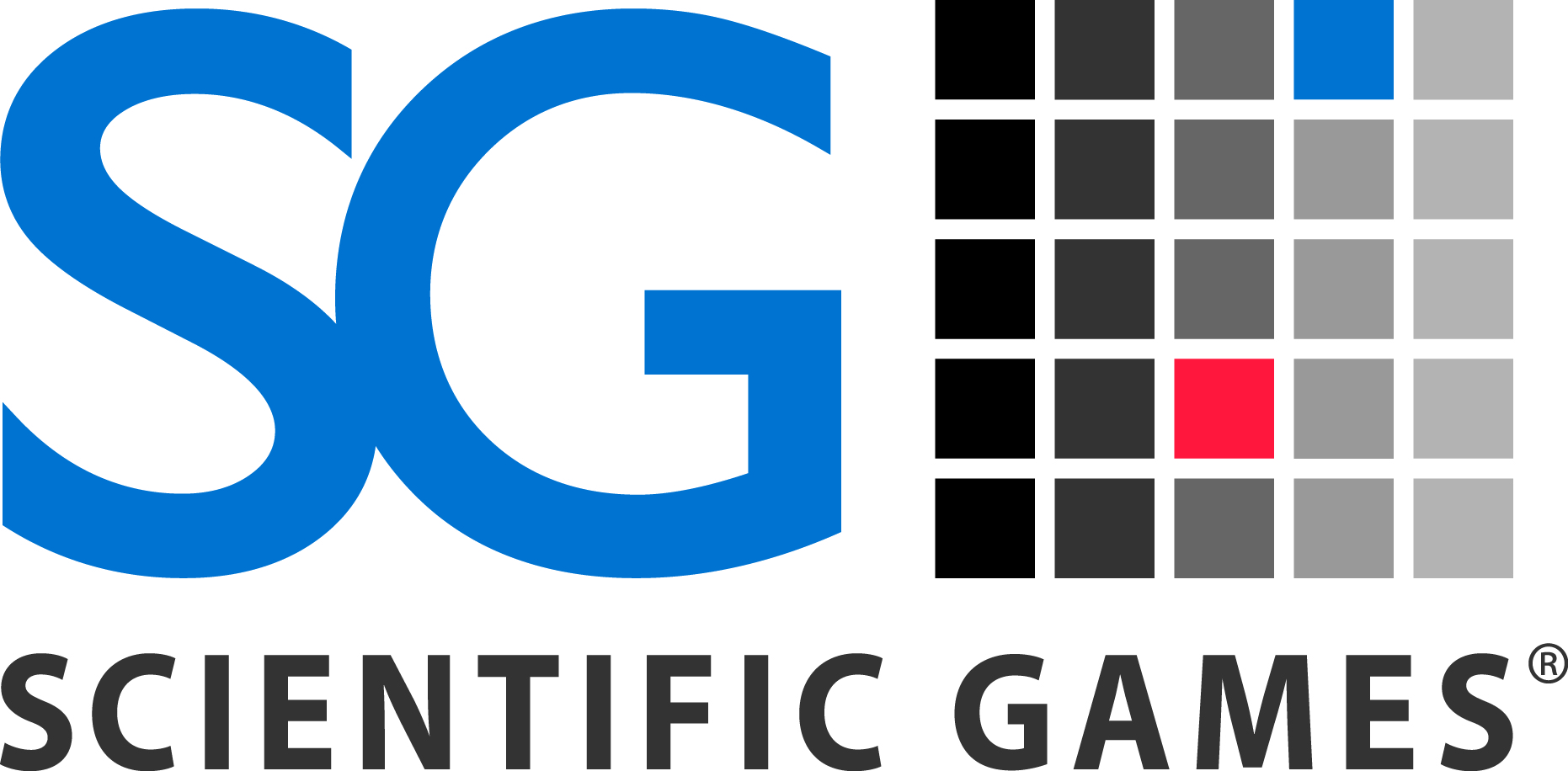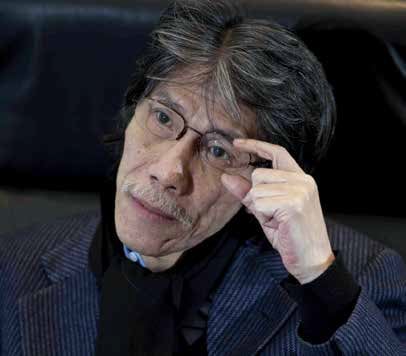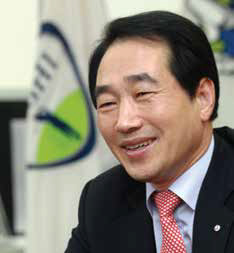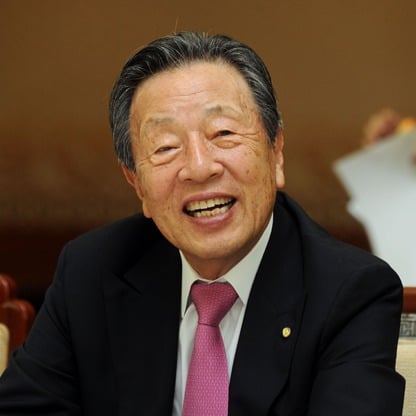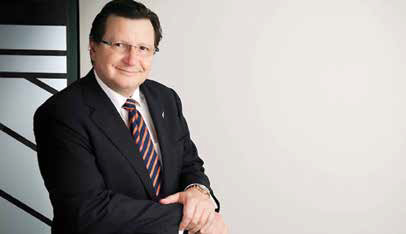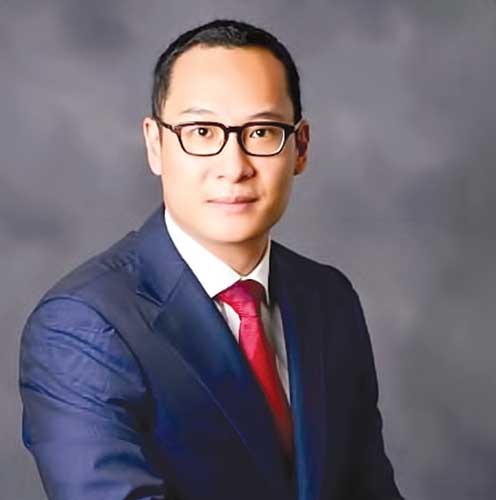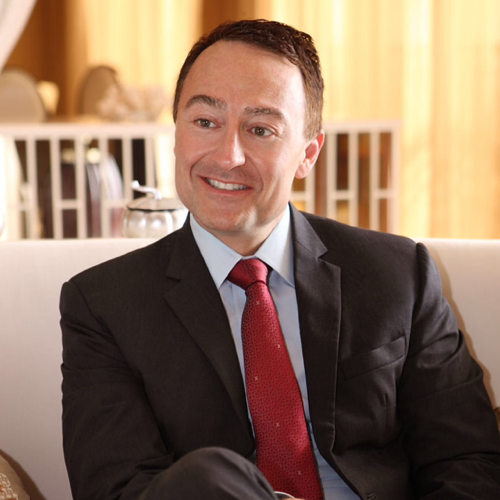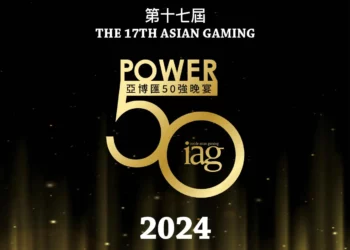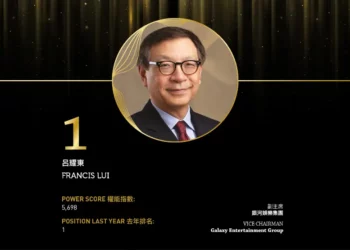31 David Chow
CO-Chairman and CEO
Macau Legend Development
The 2nd February opening of the 18th-century-Prague-themed Harbourview Hotel at Macau Fisherman’s Wharf marked the first stage of redevelopment of the moribund theme park that sits beside the city’s main ferry terminal on the Outer Harbour.
MFW, which includes the Babylon Casino and Flamingo Slot Club, was opened by local entrepreneur David Chow in partnership with Macau casino mogul Stanley Ho at the end of 2005. Its replica Tang Dynasty palace and erupting volcano failed to impress mainland Chinese visitors and have since been demolished to make way for a much-needed revamp, budgeted at HK$6 billion (US$770 million).
The revamp, divided into three phases and slated for completion in 2017, will add two more new hotels bringing the total room count to more than 1,200 (the property previously had only a single 72-room hotel), a pier, a dinosaur museum and a hoped-for 350 additional gaming tables—35 of which were granted by the government in October last year. It could fail to get all the expected tables owing to the government’s cap on the market-wide growth in the number of tables of 3% per annum.
Macau Legend Development, which in addition to MFW also operates the Pharaoh’s Palace Casino located nearby at the company’s Landmark Macau hotel, reported its gaming revenue fell 31.3% year-on-year in the first half of this year to HK$450 million ($58 million), despite the opening of the Harbourview Hotel and 35 new gaming tables. The company hastened to add, however, that its gaming revenue decline was less severe than the citywide 37% reduction recorded in the first half. Adjusted EBITDA in the period was down 70.4% to HK$128 million.
Looking ahead, Macau Legend Co-Chairman and CEO David Chow said: “We are expecting growth to return with the government reviving favorable policies to support the industry, but as revival to previously high growth momentum is not expected at this stage, we are, therefore, taking steps to manage our operating and capital costs in Macau and to explore opportunities to grow outside Macau.”
In July 2015, Macau Legend entered into an agreement with the government of the Cape Verde islands, an archipelagic nation off the northwest coast of Africa, which, like Macau, is a former a Portuguese colony, to develop a casino there. The company has received a 25-year gaming license from Cape Verde authorities, with the first 15 years on an exclusive basis. In addition, it has also been granted an exclusive nationwide 10-year exclusive license to operate online gaming, as well as physical and online sports betting in Cape Verde.
The gaming and entertainment complex, to be located in Praia, the capital of Cape Verde on Santiago Island, is expected to need US$275 million in investment and will include high-end hotels, casinos, conference centers and yacht piers, among other facilities, with construction expected to begin as early as next year.
“This resort, when completed in 3 years, will be at a hub for some of the major cities in Europe, Africa and South America, all of which have seen significant investments from China in recent years and host an untapped pool of Chinese expatriate executives and workers,” stated the company.
Mr Chow added: “We consider this investment in Cape Verde a great opportunity and allows a Macau enterprise to make use of the Sino-Portuguese platform to expand its business overseas. Also, the project follows the China government’s national policy of ‘One Belt, One Road,’ a strategy to help position Macau as one of the important cities on the Maritime Silk Road, and has the potential to lead the small and medium enterprises of Macau to expand internationally.”
Mr Chow has been involved in Macau’s gaming industry for four decades, first as a junket representative, then as a casino developer and operator. The 65-year-old investor, husbandman, high-stakes gambler, junketeer, honorary consul (Cape Verde) and all-around mover and shaker, a former member of the Macau Legislative Assembly and a longtime protégé of Stanley Ho’s, believes he still has a thing or two to teach the “new entries,” as he derides his Las Vegas-style competition on Cotai.
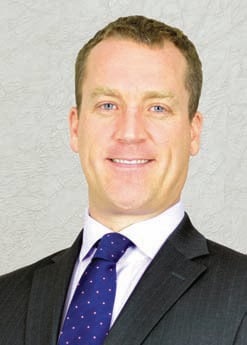
32 Mike Bolsover
Chief Executive Officer
Silver Heritage Ltd
Owing to the frontier nature of Nepal’s gaming market, “we would not expect the incumbent large Asian gaming operators to participate,” notes a Union Gaming Securities Asia Ltd report published last month. “Rather,” it adds, “we would expect Nepal to draw the interest of smaller regional operators, which ultimately could lead to market entry by medium-sized regional operators. To date, Silver Heritage (operations in Cambodia, Laos, Nepal, Philippines, and Vietnam) is the only prominent gaming operator to move forward with development.”
SHL was the first operator to be granted a gaming license by the Nepal government under newly instituted regulations as part of an industry shakeup—which notably also reversed the previous ban on foreign ownership of licenses, paving the way for SHL to become the country’s first international operator.
SHL has been operating The Millionaire’s Club & Casino at the Shangri La Hotel (not affiliated with the Kuok Group) in Lazimpat, Kathmandu, since early 2015, a boutique property currently offering 22 live gaming tables and 36 electronic gaming machines.
“The Company has been looking to invest in the Nepali tourism and recreation industry since 2011 and we are confident the Kathmandu development and the planned resort to the South of the capital represents a huge opportunity given its proximity to India and China’s massive and growing middle class and Nepal’s cultural affinity with its Southern neighbor,” SHL CEO Mike Bolsover said in a statement.
“The casino is primarily aimed at providing expanded international standard gaming opportunities for customers from the growing Indian, Chinese and Bangladeshi markets, and also services the Asian expatriate community living in Nepal,” the statement added.
SHL is also embarking on the first in a series of greenfield resort developments along the Nepal/ India border via its Tiger Palace Resorts moniker.
The company has come a long way since its inception in 2003, when Mike Bolsover and the company’s Executive Director, Tim Shepherd, first met at a hotel in Malaysia. The pair discovered they were both independently establishing sports bars and slot operations in Southeast Asian casinos.
Mr Bolsover, born in Hong Kong and with a Finance degree from Emory University in Atlanta, GA, had been a proprietary trader and business development director with the sports betting group Victor Chandler International for four years from 1999. Mr Shepherd had moved to Hong Kong in the mid 1990s and had worked as a consultant to the UK-founded bookmaker Ladbrokes and to Macauslot, Macau’s only licensed sports betting operation in which Macau’s former gaming monopolist Dr Stanley Ho has a stake.
With their common interests and complementary expertise, Messrs Bolsover and Shepherd joined forces just as Silver Heritage’s first operations began at Laos’ original licensed casino—now known as Dansavanh Nam Ngum Resort— in 2004 and later that year started working with its second licensed partner, a casino operator in Poipet, Cambodia.
It’s been a heady ride since then, with the company having parlayed its successful track record of operating small- to medium-sized slot clubs and automated casino installations to now operating and developing full-fledged casinos.
SHL has grown its business 35% CAGR over the past 3 years and in 2015 is on course to grow more than 40%. The company notes that its model is mass market casino gaming, and since its business is diversified across Asia including targeting the longneglected Indian gaming market, it has been able to weather the storm currently affecting Macau’s gaming industry.
As for upcoming new developments, the company’s first Tiger Palace Resort is under construction in Bhairahawa, Nepal. “We believe the company will likely expend approximately US$50 million on this 400-room project,” estimates Union Gaming. “Bhairahawa, Nepal borders the Uttar Pradesh state of India, which is home to more than 200 million persons. While GDP per capita in Uttar Pradesh is low (approximately US$500 per capita), there are still millions of wealthy and relatively wealthy individuals within a reasonable drive time of the site. Over time, and based on the economic opportunity demonstrated by Silver Heritage, we would expect other regional gaming operators to take notice.”
33 Choi Hung-jib
President and CEO
Kangwon Land Inc.
A 50% share in any market is pretty impressive, but Kangwon Land goes that one better in South Korea, where it holds 100% of the legal casino gambling market for Koreans. Last year, Kangwon’s monopoly on local players raked in 1,277 billion won (US$1.26 billion) in gaming revenue, up 5.3% from 2012.
But Kangwon Land’s exclusive hold on domestic players expires in 2025, and CEO Choi Hung-jib, who took office in 2011, is in charge of preparing for that day. The company’s stated goal is to have a worldclass replacement by 2020, not just to secure its own post-monopoly future but to continue its overriding mission to contribute to the economic revival of Gangwon Province, its host region. Mr Choi’s background in local and regional administration, including a stint as a lieutenant governor of Gangwon, suggests he’ll hold that focus.
Gangwon is a former coal mining area shut down as part of a government drive in the late 1980s to close inefficient mining operations. The authorities promised alternative economic plans for these areas, with the big prize of a casino for Korean players to be awarded to the most depressed region. The town of Sabuk in Gangwon, about 230 kilometers east of Seoul, was the winner. Kangwon Land, 51% owned by government entities, was formed in 1998 to restore the community’s economy and ecology. A small casino began taking bets in 2000, and a full-scale hotel, casino and theme park opened in 2003.
The casino has grown from 30 table games at the outset to 200, with 1,360 slot machines, in an expansion completed in June of last year, all under the watchful eye of the Ministry of Culture, Sports and Tourism. Restrictions on the casino to discourage problem gaming have expanded over time as well, including a ban on Koreans entering the casino more than 15 days a month, and Kangwon Land runs rehabilitation centers for problem gamblers on site and in Seoul.
To create a complete resort destination, Kangwon has added a convention hotel and attractions such as a ski resort, golf course and vacation homes under its High1 Resort brand. A US$150 million indoor-outdoor water park is due for a soft opening in the second half of 2016. Having the 2018 Winter Olympics in nearby Pyeongchang will bring new roads that will shave an hour or more off the now-harrowing threeand- a-half-hour drive from Seoul as well as highlight the region’s recreational charms.
But for now Kangwon is all about gaming. Second-quarter gaming revenue grew 16.2% to KW355.6 billion, while table volume increased 9%, attributable to last year’s expansion, according to the company. Net profit rose 32.8% to KW123.6 billion. Non-gaming revenue, less than 7% of the total, fell 16.3%, which management attributed to cancellation of bookings during the national mourning period following the ferry sinking in April that left 302 people dead or missing.
South Korea’s loosening of its policy on foreigners-only casino development is not expected to impact Kangwon Land as a gaming destination. With up to four times more players than seats on weekends and a vibe at the tables that one player compared to a factory assembly line, bettors are there because they have no other choice. If Korea lifts its ban on local players at other casinos, then all bets are off.
34 Sonny Yeung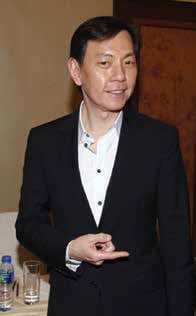
Chairman
Success Universe Group
It was a rough first half of the year for Macau’s Ponte 16 Resort— not surprisingly, given the market’s current travails—and profits plunged 73% for Sonny Yeung’s Hong Kong-listed Success Universe Group, which owns just less than half of the 408-room hotel casino along the city’s historic Inner Harbour.
For the six months ended 30th June, the company reported a net loss of HK$1.9 million as EBITDA took a beating to the tune of 40% year on year, mainly due to a 13% drop in turnover from continuing operations at Ponte 16.
But with the world’s largest casino market now 15 months into an epic correction it’s not as if the veteran Hong Kong financier and political mover and shaker, together with Stanley Ho’s SJM Holdings, which owns 51% of the resort, didn’t see it coming. Mr Yeung’s attempts to diversify around it with other gaming-related ventures haven’t exactly borne the desired fruits. A majority stake in a cruise ship operation in Hong Kong was sold off last year. Beijing’s suspension of online lottery sales earlier this year has hurt his bid to cash in on the mainland’s lottery boom. Which is not to say these weren’t eminently sensible investments in the face of ill political and economic winds blowing through Macau from China. And it would be a mistake to allow them to obscure how strongly positioned Success Universe is at Ponte 16 when the market eventually rebounds.
Talk about sensible investments, the resort cost only HK$2.4 billion (US$310 million) to build, a relative pittance compared to the fortunes being plowed into Cotai. For that, Mr Yeung and SJM got 2.3 hectares in a choice downtown location to experiment, to hone their operational chops and grow with the mass market that will define Macau’s future. To date the property features a Sofitelmanaged hotel that includes a block of 19 luxury apartments, an outdoor pool, a fitness center with a sauna, a L’Occitanebranded spa and seven multipurpose meeting rooms. There are nine restaurants, cafes and lounges. The casino provides a spacious 25,000 square meters of floor space for refining and tweaking the gambling product as the market evolves. A three-tiered players club card knits both the gaming and non-gaming offering into a comprehensive loyalty program. Looking ahead, plans are in the works to build out at the Inner Harbour with a 3,700-square-meter shopping arcade.
Add it all up and a case can be made that Success Universe deserves more credit as an innovator than it has gotten up to now. (Think Michael Jackson memorabilia museum. Ponte 16 boasts the only one in Asia. Does it get any more out-of-the-box than that?)
The next phase of the resort’s development won’t be uninteresting either if its new Macau 3D World is any indication. Conceived with the Chinese tourist’s love of a photo-op in mind, the attraction features six themed “zones” spread across 1,672 square meters of interactive 3D and 4D exhibits, paintings and special effects. As the official literature states, “Unlike traditional art museums, visitors here can be part of the art piece and change the formation of the painting by their participation. Every visitor is the director of their own photos in this 3D universe.
35 Han Chang-woo
Chairman and CEO
Maruhan Group
Japan’s massive pachinko industry is in decline. Gross revenue from the country’s primary speculative pastime—a form of quasigambling played on pinball-style machines—shrunk to 18.8 trillion yen in 2013, down nearly 40% from a peak of 30.9 trillion yen in 1995, according to a Leisure White Paper published this year by the Japan Productivity Center. The number of people playing has dropped 67% over the same period, falling to 9.7 million in 2013 from 29 million, according to the report. Major factors driving the decline include the country’s shrinking population and pachinko’s failure to attract younger players, who prefer games on their mobile phones.
Most of Japan’s 12,300 pachinko parlors are managed by small, family-run outfits, with Maruhan Group and Dynam Holdings the giants among the 4,000-plus operators. Maruhan is the biggest earner, generating close to 2 trillion yen in sales—accounting for over 10% of the entire market—across 308 venues housing close to 210,000 pachinko and pachislot machines in the 12 months ended 31st March. Although the entire industry is hurting, Maruhan and Dynam are doing better than the smaller companies, with Maruhan’s sales down 6.3% over the previous year. Maruhan and Dynam are also working to reverse the decline with improved venues and a greater emphasis on customer service.
The estimated $4 billion fortune of Maruhan’s self-made founder, Korean-born Han Chang-woo, landed him in 7th place this year on Forbes’ “Japan’s 50 Richest” list, emblematic of an industry which owing to its disrepute among Japan’s commercial elite is dominated by ethnic Koreans, especially on the operations side. Maruhan was set up in 1953 and incorporated in 1957. As Japan prospered in the post-World War II era, pachinko also thrived, and Mr Han did well enough in the ’60s to diversify into bowling alleys, driving ranges for golfers, amusement facilities, cinemas and other leisure-related businesses. In the 1970s, he returned his focus to pachinko and rode the wave of the country’s ’80s economic boom, which left him well-positioned to take advantage of the long slide that followed, when he continued to build the company by exploiting the decline in asset prices to increase Maruhan’s market share.
Mr Han, now 85, has expanded his reach into more centralized locations. He’s built multi-story emporiums that lure customers with innovations that include non-smoking sections, free parking and improved odds. The cash flow from these large, successful outlets has helped transform Maruhan into the conglomerate it is today. The company’s Maruhan Japan Bank subsidiary has been expanding in Cambodia, Myanmar and Laos.
Mr Han also continues to invest in his homeland, Korea. His latest project is the ambitious 2.4 trillion won ($2 billion) Dream Island, an entertainment hub including water parks, aquariums, luxury hotels, shopping malls, marinas, theme parks and golf courses to be built on reclaimed land on Korea’s Yeongjong Island. Notably, Yeongjong, the site of the nation’s gateway airport serving the capital, Seoul, has become a locus of the Korean government’s integrated resort development strategy. So while Maruhan has expressly said that Dream Island, scheduled to break ground later this year, will not include a gaming component, don’t be surprised if the plans eventually evolve to include a casino.
36 Nigel Morrison
Managing Director
SKYCITY Entertainment Group
Nigel Morrison is positioning New Zealand’s SkyCity Entertainment Group to play an increasingly prominent role alongside Down Under rivals Crown Resorts and Echo Entertainment in an increasingly lucrative competition for Asia’s high rollers.
The NZX-listed six-casino group grew turnover from “international business,” as it terms the VIP sector, a robust 43% in the 12 months ended 30th June, with SkyCity Auckland, the corporate flagship known for its landmark Sky Tower, the standout performer at NZ$6 billion, a 39% increase year on year.
“We have taken on more people in Southeast Asia marketing that business, promoting our properties and bringing those players,” Mr Morrison noted when the fiscal 2015 results were released. “The pie is getting bigger.”
He may be assumed to have a pretty good idea of how big too. A numbers guy by training, his gaming industry experience spans two decades and has included senior roles at Crown, where he was chief operating officer, and at Macau’s Galaxy Entertainment Group, where he was CFO.
He’s also proven himself a savvy negotiator, maintaining the exclusive licenses enjoyed by SkyCity Adelaide in South Australia and SkyCity Darwin in the Northern Territory while securing expansions at both. Darwin, it’s worth noting, saw its international business more than double over the last 12 months.
His focus now is on executing a comprehensive expansion strategy whose first plank was laid in Auckland in 2013 via a critical agreement with the government of New Zealand. The company has committed to building a NZ$450 million International Convention Centre at SkyCity Auckland in exchange for a sizable expansion of its largest casino—230 more machine games and 40 new tables, an option to add either 12 additional tables or 240 ETG positions, permission to deploy cashless gaming across the entire operation and higher limits on a portion of the slot floor.
A pretty big deal in all considering that last year Auckland generated 60% of group revenue and 81% of group EBITDA.
What this also achieved was to allow Mr Morrison to turn his attention to transforming SkyCity Adelaide into the hub of a governmentsponsored entertainment precinct on the banks of the River Torrens and a credible destination for the Asian VIP trade. The first A$50 million phase was completed early this year with a topto-bottom refurbishment and reconfiguration of the existing gaming and non-gaming product that included the introduction of cashless wagering, the creation of new high-limit areas and the opening of two gourmet restaurants.
Next up is the addition of a six-star boutique hotel to go with a significantly expanded casino floor and more private VIP rooms and signature restaurants. The cost is estimated at A$350 million.
37 Joey Lim
Managing Director and CEO
Donaco International
Joey Lim is making quite a name for himself, befitting the one he was born with. In 2002, Mr Lim and his grandfather, Genting Group founder Lim Goh Tong, started Donaco. Now it’s the Donaco head’s bold initiatives putting the Australia-listed company, which has no business ties to Genting, in the spotlight.
Last November, Donaco completed construction of Aristo International, which had a soft opening six months earlier, replacing Lao Cai International Hotel built in 2003. Vietnam’s Lao Cai is a great spot for a border casino; residents of China’s neighboring Yunnan province can cross the border visa-free and stay up to 48 hours. The new $55 million Aristo is a significant upgrade over its predecessor, with 428 guest rooms, 40 gaming tables and 58 machine positions in its foreigners-only casino. Gaming turnover—overwhelmingly VIP—rose 17% during Donaco’s fiscal 2015 that ended 30th June, but revenue fell on a VIP win rate under 2%. Management wants to boost mass play, targeting Hanoi’s expatriate community, now just three hours away via a new highway. Donaco says property net revenue in July was $1.8 million, 69% above July 2013 and 55% better than the FY15 monthly average.
In January, Donaco reached a deal to acquire Star Vegas Resort and Club in Poipet, the Cambodian border casino area closest to Bangkok, for $360 million, an eye-popping price for that market. Fans of the deal say Star Vegas, with 109 tables and 1,264 machines, plus 385 hotel rooms, is a best-in-market asset. The seller, a Thai businessman, has taken a third of the price in Donaco stock and is guaranteeing annual EBITDA of $60 million—the 2014 level—for the first three years. The acquisition, closed 1st July, dwarfs Donaco’s previous business, which consisted solely of Aristo after completing sales of two mobile technology subsidiaries last year. Donaco expects Star Vegas to produce 85% of its FY16 revenue.
Last month, Donaco announced two more deals. It signed a three-year contract with English football’s Manchester United as “exclusive casino resort partner” for Thailand, Cambodia, Vietnam, Laos, Myanmar and South Korea, where Donaco is reportedly among hopefuls for a casino license. “Through our partnership with Manchester United, we look forward to delivering compelling marketing campaigns to better engage with our customers and fans and help expedite our growth and footprint across the region,” Mr Lim says.
Donaco also signed a three-year deal with Macau VIP promoter Heng Sheng Group for Star Vegas, expanding its customer base beyond Thais. Under the revenue share agreement, Heng Sheng will guarantee minimum monthly roll equivalent to 3 billion Thai baht ($83 million), equivalent to 30% of current Star Vegas turnover, as well as assuring a minimum win rate and paying all junket commissions. A new dedicated VIP area with capacity for 50 tables plus an exclusive entrance and restaurant is on track to open this month, with Heng Sheng sharing building costs. Players will fly into Siem Reap, about two hours by road from Poipet and site of the Angkor Wat complex, a popular destination for Chinese tourists, Pacific Financial Services founder Tony Tong, a consultant on the deal, notes.
“This deal provides an illustration of the multiple growth opportunities for our Star Vegas business,” Mr Lim says. It also highlights the vibrant vision Donaco is bringing to Asia’s small markets.
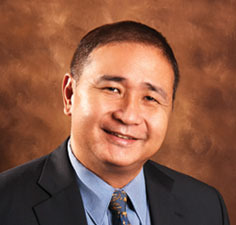
38 Cristino Naguiat
Chairman and CEO
Philippine Amusement and Gaming Corporation
In 2011, Wynn Resorts could cite its then-largest shareholder and vice chairman Kazuo Okada’s intention to open a casino in the Philippines as a threat to its gaming licenses in Nevada and Macau. The Philippines’ regulatory environment was considered lax and corrupt, with former Pagcor Chairman Efraim Genuino and associates facing graft charges.
In September last year, Caesars Entertainment used Philippine President Benigno Aquino III’s visit to the US for a personal appeal to build a $1 billion integrated resort at Manila’s international airport. Having an American brand among the handful of private casinos in the Philippines would boost Manila’s appeal. Caesars seemed like a great idea to President Aquino and his revenue-hungry Finance Ministry.
But Pagcor Chairman Cristino Naguiat saw things differently. Pagcor already had four licensees committed to invest some $6 billion on IRs in Entertainment City on Manila Bay. The second IR, Melco Crown’s City of Dreams Manila, a partnership with the Philippines’ richest family, the Sys, opened in December. Even though there’d been no promise of exclusivity, Pagcor felt it would show bad faith to bring in another competitor before those IRs got established.
The Caesars story highlights how Pagcor has changed under Mr Naguiat. The Philippines has become a more respectable gaming jurisdiction, and Pagcor a more professional regulator that understands the operator’s perspective. After all, the government-owned company— formally Philippine Amusement and Gaming Corporation—operates 11 casinos of its own and two-dozen smaller gaming venues across the archipelago. On Mr Naguiat’s watch, Pagcor closed two of its four casinos in Metro Manila, one near Entertainment City and the other near Resorts World Manila, a joint venture of Genting Hong Kong and local billionaire Andrew Tan that’s also building in Entertainment City. Competing with Entertainment City is “not our role,” Mr Naguiat says, while asserting, “Pagcor is still viable, very viable, especially if you look at our operations in the provinces.”
Last year, Pagcor cut license fees, in effect the gaming tax, to offset court-imposed income taxes that it promised licensees would not have to pay, but it’s not always a soft touch. Pagcor confiscated a P200 million ($2.2 million) performance bond from Manila Bay Resorts for failing to meet its opening deadline of 31st March, while granting an 18-month extension. The regulator has let law enforcement handle bribery and fraud allegations surrounding Mr Okada’s project, while insisting the resort must comply with land ownership laws to get Pagcor’s permission to open.
A former Pagcor auditor who left to run a hospital, Mr Naguiat was handpicked to head Pagcor in July 2010 by President Aquino. He’s likely to leave office when Mr Aquino does in the middle of next year. Even though Entertainment City’s concept and licensee selections date back to his predecessor and its completion will occur under a successor, its birth with Philippine billionaire Enrique Razon’s Solaire Resort and Casino in March 2013 will be Mr Naguiat’s legacy. Entertainment Ciy and RW Manila’s ongoing expansion have helped the country maintain gaming revenue growth—albeit not at the heady rate of Macau’s early post-monopoly era—from around $2 billion when he took office to $2.5 billion last year and perhaps $3 billion this year.
His other potential legacy, of a more credible and professional Pagcor, seems less assured. But Mr Naguiat is confident that the reformist spirit will outlive the Aquino administration (and his own). “There have been a lot of good people joining the government and changes in the way the government operates,” he says. “It’s hard to break that chain of positive developments.”
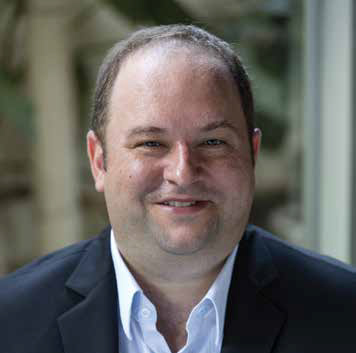
39 Colin Pine
General Director
Ho Tram Project Company
MGM Resorts International pulled out as management partner of Vietnam’s The Grand Ho Tram Strip on the eve of the US$500 million resort’s much-anticipated opening last July. That it got open at all is a tribute to the reputation, the steady hand and the lobbying skills of Colin Pine.
Mr Pine heads Ho Tram Project Company, which took the helm after MGM’s exit as a subsidiary of Asian Coast Development (Canada) Limited, the investment consortium that conceived The Grand and whose backers include American hedge fund tycoon Philip Falcone.
Mr Pine is well-known and respected in Vietnam and was able to negotiate with the central government on reforms to regulations concerning tax and international banking transactions to bring the country into line with international norms prevailing in other major gaming jurisdictions. A fluent Vietnamese speaker who’s been working and investing in the country for 18 years, he is credited with winning approval for the first foreign-owned school in Hanoi to acquire land for a purpose-built campus. At one time he ran a Vietnamese company that acquired a foreign-owned five-star hotel. He also helped found the country’s first privately owned airline.
Challenged by a longstanding ban on domestic play and its distance from Ho Chi Minh City, about a two-hour drive under current conditions, The Grand has struggled to recoup its investment. For all that, though, it is a beautiful property, Vietnam’s first true destination casino, with 541 five-star hotel rooms and loads
of inherent appeal. It fronts two kilometers of gorgeous beach on the South China Sea coast of Ba Ria-Vung Tau province, surrounded by protected forest land, and now boasts a Greg Norman-designed golf course that is holding its official ribbon-cutting next month.
The game changer for The Grand would be an end to the prohibition on domestic play, something Mr Pine and his team have been working to achieve. The Ministry of Finance has drafted a new set of gaming regulations that includes a provision for opening the country’s casinos to its 90 million citizens, and political momentum appears to be building in favor of it. The draft is slated to be submitted to Prime Minister Nguyen Tan Dung this fall and could be approved by the end of the year.
40 Michael Santangelo
Chief Operating Officer
Jeju Sun Hotel & Casino
Enrique Razon is looking to be in the thick of a dramatic expansion of resort-scale gaming in South Korea, and he’s turned to Michael Santangelo, the American who helped get Vietnam’s first integrated resort off the ground, to play a seminal role.
The Philippine billionaire behind Manila super-resort Solaire has staked out territory in the two places where the Korean government’s nascent IR strategy is expected to coalesce. He’s secured agreements to purchase two small islands in the development core known as the Incheon Free Economic Zone, which lies about 30 miles west of Seoul and includes the country’s main international airport, and he’s picked up an active casino license on the island of Jeju, a popular visa-free destination for Chinese holiday-makers off the country’s south coast.
Jeju, rich in natural beauty, is also home to the largest collection of casinos in South Korea—seven in all. Their combined revenues pale in comparison with the Seoul area. But the local government is focused on grabbing its share of the Chinese tourism pie. Genting Singapore is already there with plans for a multi-phased resort that could total US$1 billion when it’s fully built out. Analysts expect the island to grant up to two more licenses for integrated resorts. Mr Razon wants one of them. That’s where Mr Santangelo comes in.
The Jeju license was acquired in March when Mr Razon’s new Solaire Korea unit bought T.H.E. Hotel and LVegas Casino, a 30-yearold property with around 200 rooms and a small, under-performing gaming floor. By June, it had been renamed the Jeju Sun, the casino was closed down for an overhaul, and Mr Santangelo was chief operating officer, charged with turning the place into a money-maker, and in doing so, to position Solaire Korea as a top contender for one of those IR licenses.
As president, COO and CFO at The Grand Ho Tram Strip, Mr Santangelo had a $500 million showplace that was sparkling new when it opened on the South China Sea coast in the summer of 2013. But there was no precedent in the Vietnam market for anything on the scale of The Grand, and it was Mr Santangelo’s job to get it up and running from scratch—recruitment, marketing, IT, finance, security, daily operations—the works. So he’s well-seasoned for his new responsibilities. On Jeju he’ll have no domestic market to draw on, that’s against the law at all but one South Korea casino. It won’t make his job any easier. But then he didn’t in Vietnam either. No doubt, this figured prominently in Mr Razon’s decision to hire him. His five years’ experience at two multibillion-dollar resorts on the Las Vegas Strip is another plus. Prior to moving to Vietnam he handled the books at The Venetian as vice president of finance and controllers and later served at The Cosmopolitan in the same position.
Next: The Asian Gaming 50 – 2015: 41-50







